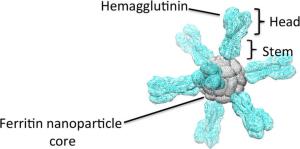 Research teams at the University of Washington School of Medicine and The Vaccine Research Center of the National Institute of Allergy and Infectious Diseases (NIAID) have developed an innovative influenza vaccine. The technology allows arrangement of a series of hemagglutinin (HA) antigens in an array on a nanoparticle.
Research teams at the University of Washington School of Medicine and The Vaccine Research Center of the National Institute of Allergy and Infectious Diseases (NIAID) have developed an innovative influenza vaccine. The technology allows arrangement of a series of hemagglutinin (HA) antigens in an array on a nanoparticle.
Initial animal studies have demonstrated that the immunogenicity of the nanoparticle vaccine is equivalent to the protection provided by current quadrivalent products.
In animal trials including mice, ferrets, and non-human primates, the nanoparticle vaccine stimulated an antibody response to a range of viruses not included in the mosaic nanoparticle formulation. These included avian influenza H5N1 and H7N9 which are regarded as zoonotic and a potential pandemic threat.
 Dr. Daniel Ellis of the University of Washington noted "the response that our vaccine gives against strain-matched viruses is really strong and the additional coverage we saw against mismatched strains could lower the risk of a bad flu season." Ellis observed "each year the World Health Organization makes a bet on which four strains will be most prevalent, but those predictions can be more or less accurate. That is why we often end up with mismatched flu shots that are still helpful but only partly effective,"
Dr. Daniel Ellis of the University of Washington noted "the response that our vaccine gives against strain-matched viruses is really strong and the additional coverage we saw against mismatched strains could lower the risk of a bad flu season." Ellis observed "each year the World Health Organization makes a bet on which four strains will be most prevalent, but those predictions can be more or less accurate. That is why we often end up with mismatched flu shots that are still helpful but only partly effective,"
It is hoped that the nanoparticle technology will be applied to developing influenza vaccines for commercial avian species to provide a broader spectrum of protection than current inactivated emulsion vaccines.